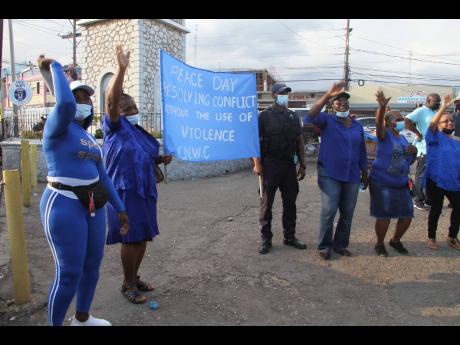Kristen Gyles | Restoring respect for law enforcement
Earlier this week, many Jamaicans saw a viral video of a disturbing incident which took place on a school compound in St Catherine between the mother of a student and a policewoman. It is alleged that the woman was at the school for a meeting and while on the compound, the police were called to remove her from the premises on account of her behaviour.
In the recording of the incident, which lasted several minutes, the policewoman could be seen holding on to the civilian’s hair while the civilian held on to the front of the officer’s uniform shirt. The officer repeatedly told the woman to get into the police van, but the woman would not budge and continued to resist the officer’s arrest. Eventually, a male officer had to come to the aid of the policewoman to get the civilian into the police car.
The video was very uncomfortable to watch for so many reasons. For starters, it is clear that there has been a serious breakdown in the respect citizens have for law enforcement. If the breakdown is to be addressed in any meaningful way, the reasons for the breakdown will first need to be examined.
In times gone by, citizens worked closely with the police. Today, to be seen speaking with a police officer for too long can be dangerous, especially when you live in a volatile community.
HARDLY WELCOMED
In times gone by, the police had a strong presence in many communities and addressed many of the domestic and other social conflicts that could spiral into crime. Today, the police are hardly welcomed into some residential spaces.
This shift in culture signals a decline in the level of collaboration and trust between the citizenry and the police. Sadly, the police and the citizenry have played a role in effecting this culture shift.
Imagine you are travelling on one of Jamaica’s major highways, trying to get to your destination quickly. In your haste, you accelerate to about 90 kilometres per hour (kmph), which is in fact above the 80 kmph speed limit. A few minutes into the journey, two police officers lurking behind a sharp corner, half-hidden by bushes on the side of the road, step out into the road and tell you to pull over. Upon pulling over, they tell you that you were exceeding the speed limit and ask you what you can do for yourself. You bypass your ethical code and offer $4,000 in exchange for a ‘bly’. The cash is readily accepted and you are sent on your way.
What does this type of event do to you as a civilian?
Your level of trust in the police force goes down a few notches. If the police can so easily be bought out with ‘drinks money’, who and what can’t buy them out?
The trust factor is a big issue the police force must work on. If citizens don’t trust the police, they won’t cooperate with them. Each time a police officer takes a bribe, it diminishes the many upstanding and professional members of the force. The police also need to recognise that as agents of the law, they have a duty to be impartial in administering the law. When it is not offering cash for pardon, some Jamaicans know all they need to do is pull into their wallets or handbags for an ID and that will put the matter to rest for many officers.
Now, imagine you are pulled over by the police who tell you that you failed to stop at a stop sign you passed 30 seconds earlier. You protest by saying that you did in fact stop. The police then tell you that you chat too much and start insulting you.
It is now easy for you to associate the police with hotheadedness and egotism. For what other reason does an individual get upset and lash out simply because they are challenged?
HITTING HER
In the video which made the rounds earlier this week, the civilian accused the policewoman of hitting her. The policewoman responded by explaining that the civilian had pointed in her face, to which the civilian replied, “Mi did lick yuh?”
While the civilian acted disrespectfully and defiantly, pointing in someone’s face does not warrant physical assault. But, to an irate or ego-bruised officer, it just might.
As an aside, police officers must also first respect themselves and their profession before expecting to retain the respect of civilians. While citizens are arrested for using foul language in public spaces, some law-enforcement agents have a filthy sailor’s mouth that they use quite freely. Crass and disrespectful comments to citizens and sexual advances towards members of the opposite sex while on duty further erodes the already declining sense of respect for the police. Self-respecting professionals who take their work seriously must act with a certain degree of professionalism and sense of purpose while on the job.
That being said, law-abiding citizens have also played a role in the declining respect for police. Firstly, many citizens have not made themselves aware of their responsibilities and obligations under the law when interacting with law-enforcement agents. For example, many seem blissfully unaware that it is unlawful to resist arrest and think it is okay to use threatening language or gestures when interacting with police, as they would do casually with their friends and associates.
We also make the work of the police many times more difficult when we support or encourage law-breaking or bad-behaving citizens in their confrontation and disrespect towards the police. We can help to restore law and order by encouraging respect for law enforcement.
Kristen Gyles is a free-thinking public affairs opinionator. Send feedback to kristengyles@gmail.com and columns@gleanerjm.com.

